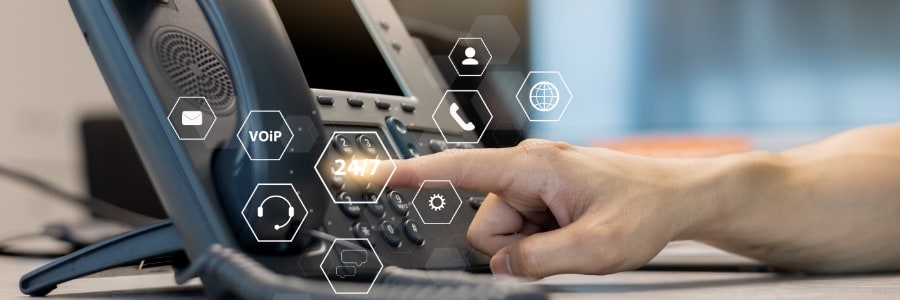
Voice over Internet Protocol (VoIP) phone systems make business communication easier, cheaper, and more flexible than traditional phone lines. But with those benefits come risks, from data theft to call hijacking. The good news is that protecting your system doesn’t require deep technical knowledge. These VoIP security measures can help you keep your business safe and connected.
1. Use strong, unique passwords (and add a second layer)
Weak or reused passwords are still one of the biggest security gaps. Every account linked to your phone system, such as user logins, admin panels, and provider dashboards, should have its own strong password. Adding two-factor authentication (2FA) gives you a second layer of protection, making it much harder for attackers to get in, even if they guess or steal a password.
2. Confirm your provider encrypts calls and data
Encryption turns your calls and messages into unreadable data, keeping prying eyes and ears out. Ask your VoIP provider whether they encrypt both your call traffic and account information. If they do, your conversations are safe from interception. If not, it’s time to look at other providers who take security seriously.
3. Turn off unused phone features, like the web interface
Many VoIP phones include web-based setup tools that you might never use. While convenient, they can also be an open door for hackers. Turning off unused features reduces the number of ways unauthorized parties can access your system. The fewer doors you leave unlocked, the better.
4. Work with an IT partner who watches your systems 24/7
Cyberattacks don’t stick to office hours. Having an IT team or managed IT services provider that monitors your systems around the clock means threats can be spotted and stopped before they cause damage. Continuous monitoring also helps detect unusual behavior, such as sudden spikes in call activity or login attempts, so issues can be fixed fast.
5. Use a VPN for remote workers and sensitive links
If your team works remotely, a virtual private network (VPN) can protect their connections. A VPN creates a private “tunnel” for data between devices and your phone system, keeping calls and credentials safe from snooping. It’s especially useful for employees connecting through public Wi-Fi or home networks.
6. Protect VoIP traffic with a suitable firewall
Not every firewall is built for VoIP. Look for one that’s designed to recognize and manage phone traffic, block suspicious call activity, and prevent unauthorized access. A good VoIP-aware firewall helps maintain call quality while reducing the chance of attacks or downtime.
7. Use AI-powered monitoring and analytics
Modern AI-powered tools can make your security smarter. They can automatically detect unusual call patterns, alert you to potential fraud, and even stop suspicious activity in real time. For example, AI can flag if someone is making hundreds of international calls at once — a common sign of compromise. These systems don’t replace humans, but they do help catch problems faster and more accurately.
8. Prepare your VoIP system for 5G
As 5G networks continue to roll out, they bring faster speeds and better reliability, but also new security considerations. With more devices connected and more data moving at once, it’s important to ensure your VoIP setup uses secure connections and up-to-date hardware. Work with your provider to confirm that your phones and routers are 5G-ready and have the latest firmware and encryption protocols in place.
9. Secure your UCaaS and CPaaS integrations
If your business uses Unified-Communications-as-a-Service (UCaaS) or Communications-Platform-as-a-Service (CPaaS), make sure all connected apps follow the same security standards. Limit who can access integrations, review app permissions regularly, and verify that your provider applies end-to-end encryption across all communication channels. The more unified your communication tools are, the more consistent your security should be.
You don’t need to be an IT expert to protect your phone system. Just take smart, practical steps that make sense for your business. By following these VoIP security measures, you’ll keep your calls private, your data protected, and your business communications running smoothly no matter how technology evolves.